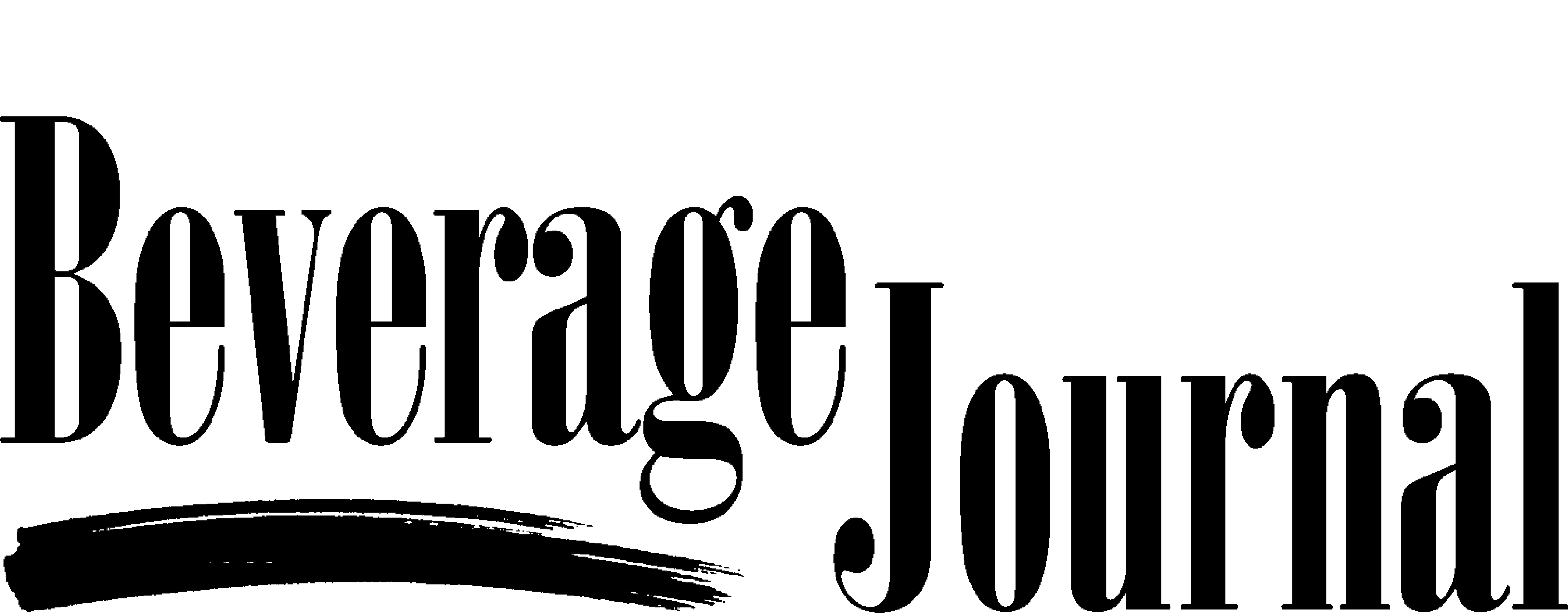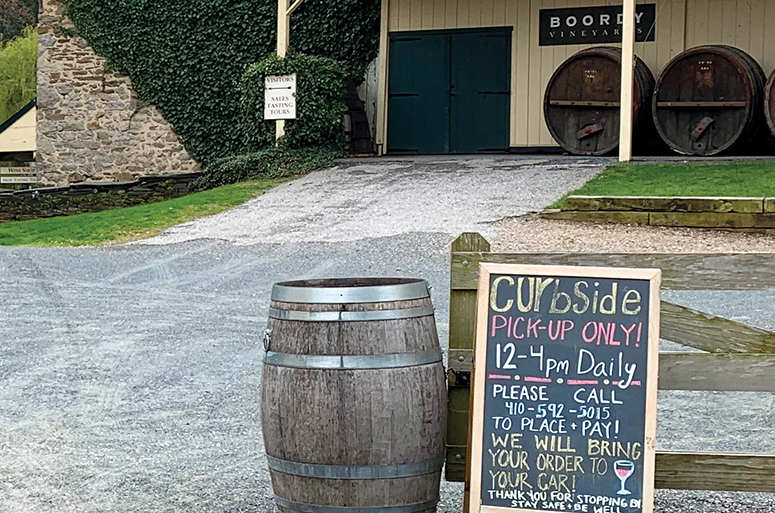Trending Articles ...
Coronavirus and the Local Market
Boordy Vineyards is taking orders and payments over the phone and will bring your wine to your car.
 Some are getting by with a little help from their friends. Or, in the case of Jimmy Spiropoulos, operator of Town Center Market in Riverdale Park, a few special customers. "We're now working behind sheets of Plexiglas that we have installed," he said. "They're hanging from the ceiling at each one of our five checkout counters. Basically, I went and bought five large sheets, and I had one of my local handymen -- who's actually a customer of mine -- install them. Customers seem to really appreciate the steps we've taken to try and protect everyone."
Some are getting by with a little help from their friends. Or, in the case of Jimmy Spiropoulos, operator of Town Center Market in Riverdale Park, a few special customers. "We're now working behind sheets of Plexiglas that we have installed," he said. "They're hanging from the ceiling at each one of our five checkout counters. Basically, I went and bought five large sheets, and I had one of my local handymen -- who's actually a customer of mine -- install them. Customers seem to really appreciate the steps we've taken to try and protect everyone."
He continued, "There is another customer of ours named Mike. He's an IT guy along with his wife, and they've basically set up our website to have an online ordering form for curbside pickup or delivery. Those orders are keeping us very busy. The challenge is the time it takes to put each one together is probably five or six times the normal transaction."
Kevin Atticks, founder of Grow & Fortify whose clients include the Maryland Wineries Association and the Brewers Association of Maryland, singled out Brendan and Bailey O'Leary , owners of True Respite Brewery in Derwood. They have created an app called "Miermi," which organizes and automates the ordering/delivery process. One of their partner/investors created it within a day of the initial shutdown and has offered it for free use by the brewing community.
Others are surviving these tough times by putting even greater reliance on their employees. Ben Golueke of Mt. Airy Liquors in Carroll County said he and his staff have been busier than ever. "March ended up like a December," he stated, "which is our busiest month of the year. Other changes have been the amount of cleaning we are doing. It really has become after every single customer. Not to mention the constant wipe downs of carts, hand-trucks, beer box handles, door knobs, phones, etc."
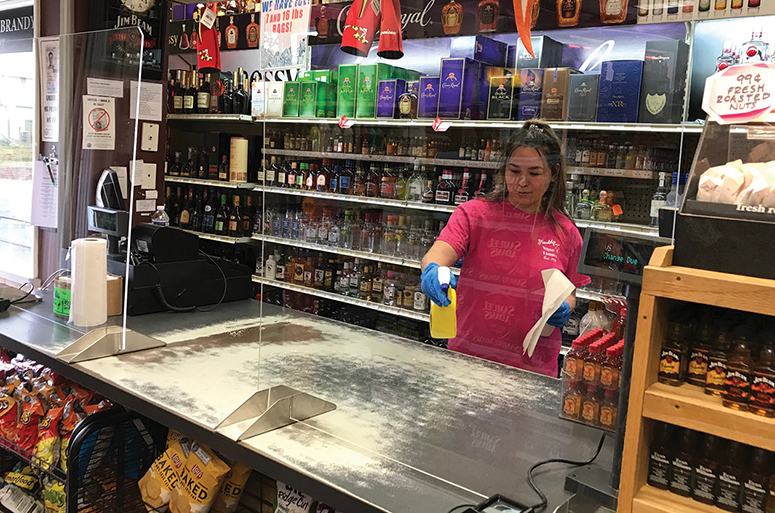
The new Plexiglas now installed at Friendship Wine & Liquors' in Abingdon.
Just the opposite, Marshele Burgess, proprietor of Rip's Country Inn in Bowie, has had to deal with losing a large chunk of her business. She lamented, "The biggest change for us is the restaurant is closed to dine in and I have 104 employees that count on Rip's for a living. We have gone to carry-out only. Daily, we are trying to be more creative with that. Restaurant sales are down 90 percent. We're keeping restaurant staff employed with jobs at the liquor store and maintenance projects in the restaurant -- painting everything, deep cleaning refrigeration, etc. We are also taking the time to work on retraining staff. They are taking online courses with ServSafe to have all up-to-date information."
And still for others, it's been the operational changes that have been among the most challenging to get used to. Just ask Mike Scheuerman of Friendship Wine & Liquor in Harford County. In addition to implementing curbside pickup for the first time, which may become a permanent part of the store's business model after the pandemic is over, he and his staff have reduced store hours. "Specifically closing time, which we have scaled-back by two hours both weeknights and weekend nights," he said. "Also, we have substantially reduced our 'floor service,' but have added a position specifically for replying to e-mails and answering phone calls. We also ceased hosting in-store tastings immediately back when this all began."
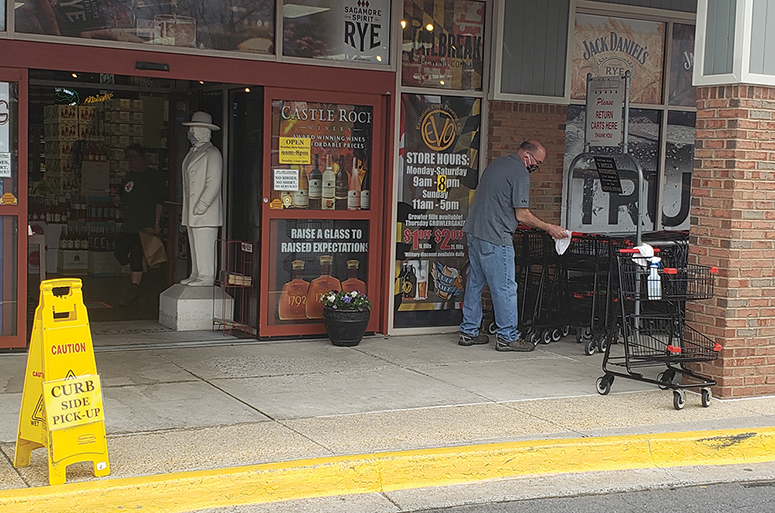
Mount Airy Liquors in Mount Airy is offering curbside pick-up and is ensuring all carts are continually cleaned for their customers.
E. Randolph Marriner, chairman and founder of the Victoria Restaurant Group and Manor Hill Brewing, chimed in, "As a brewery that self-distributes in Montgomery County, we've added more delivery days to our weekly calendar. This has two purposes. One, it allows our retail partners in the county to be more flexible and re-stock more quickly. And, two, it allows our driver to take the time to ensure he's being safe on the road and in stores. Fewer deliveries per day means less rushing and making sure all the safety steps of sanitizing and cleaning are being followed."
Of course, more than just packaged goods stores and eating and drinking establishments are having to change in this time of pandemic. Maryland's wineries are scrambling also. Boordy Vineyards has remained open for carryout bottle sales, but has had to close its Tasting Room and postpone all on-site events, private tours, winery rentals, and casual visitation.
Boordy President Rob Deford commented, "The immediate impact is huge, and its ultimate severity will depend upon the duration of the shutdown. As a result, we've put an indefinite hold on all discretionary expenses and capital projects and have idled all part-time staff who work our events. There does appear to be a mitigating factor, which is that our sales in stores have increased since March 14 when the first restrictions on social interaction were imposed. Also on the positive side, our Internet sales have increased dramatically -- a by-product of folks being confined to their homes."
Local Help From
National Resources
Another positive is the stepped-up help many of the beverage industry's national trade associations are offering. The Distilled Spirits Council of the United States (DISCUS) sprang into action on Capitol Hill. Lisa Hawkins, Senior Vice President of Public Affairs, pointed out, "We were successful in getting a provision in the recently passed CARES Act to ease tax regulations so that distillers producing hand sanitizer would not have to pay federal excise taxes on the alcohol used."
She added, "There were other important provisions DISCUS lobbied for in the CARES Act to help craft distillers, including Small Business Administration loans and emergency grants. . . . As Congress works to provide additional economic relief to affected businesses, we are reaching out to legislators to underscore the important role of distilleries in boosting their local economies, and their connection to the hospitality, restaurant, and tourism industries. The closures of craft distilleries in Maryland would be an incredible loss to the state's economy. We are asking Congress for additional stimulus measures including federal excise tax relief; suspension of tariffs on distilled spirits; robust no- and low-interest loan assistance; and the creation of an industry stabilization fund."
The National Beer Wholesalers Association (NBWA) has also tried to stay out in front of the crisis for its membership. President and CEO Craig Purser stated, "NBWA has been in constant communication, sharing best practices from across the country with our members. We're getting them the tools they need to be successful during this uncertainty, from the cleaning products to have on hand to the best ways to structure their operations for social distancing. We're also sharing best practices they can tap into to help the community, like donating refrigerated trucks to food drives or giving water and other non-alcoholic drinks to first responders."
Maryland State Licensed
Beverage Association
On the state level, the Maryland State Licensed Beverage Association (MSLBA) has been doing its part. Steve Wise, MSLBA's legal counsel, said the first and most important thing the association is providing its members is "accurate and timely communication. Governor Hogan has issued numerous Executive Orders affecting bars, restaurants, and package stores. Members have called literally while the Governor is still speaking at press conferences, asking, 'What does this mean for us?!' We're helping members by reading the Orders carefully, verifying our understanding of them with state officials, and then getting concise information out to members quickly."
Wise further noted that the MSLBA is trying to provide as much information on small business loans and grants as it can. It's also sharing recommendations provided by health officials for protecting employees, customers, and the community.
Still, there is no doubt the ongoing pandemic represents the biggest crisis all concerned have ever faced from a business and just a sheer survival standpoint. Everyone interviewed for this article feel they are being tested like never before. Town Center Market, for instance, had just completed a new, $250,000 outdoor patio that was barely open before having to be shut down. "We were also a big lottery retailer, and those commissions have essentially gone to zero," Spiropoulos lamented.
Marriner added, "In an industry that relies on scheduling and planning months down the road, the uncertainty is a big test. But it's compounded by how quickly things are changing, as well. We have an incredible team of hardworking individuals who look to us for answers during this time. And there aren't a lot of answers we can provide. Or, the answers we give are subject to change on a daily basis."
Burgess, meanwhile, was not afraid to admit that the biggest test of her leadership has been "trying to keep the employees calm, positive, and not see the stress that ownership is under! The biggest test is to hold the business together for everyone until this passes."
Association executives are dealing with the pressures in their own way. Ever the proactive organization, DISCUS recently held a virtual #SpiritsUnitedToast to bring industry folks together. More than 400 people joined the toast. Hawkins said, "As part of the virtual event, Justin Cara-Donna, one of D.C.’s top bartenders at the Columbia Room, led a cocktail demonstration featuring tips on how to create the perfect at-home cocktail. During the virtual toast, we raised an additional $10,000 for [the United States Bartenders Guild's] COVID-19 relief fund."
MSLBA President Aashish Parikh's thoughts turned more inward. He said, "We have duties as officers of the Association, so we have to remain calm and think ahead about how we can respond to not only the immediate needs of our members, but also what will be needed in the months ahead when hopefully we start to recover from this. We have already started thinking of ways to help get on-premise businesses back on their feet as quickly as possible."
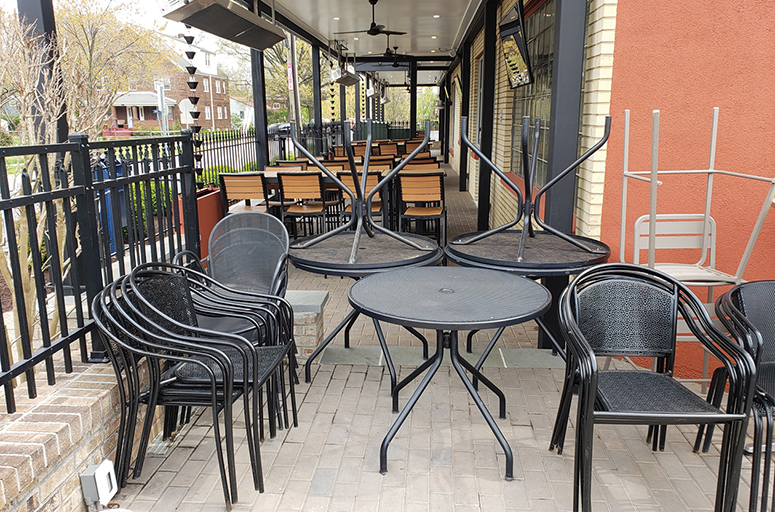
Unused seating at Town Center Market's new $250,000 patio in Riverdale Park.
And, yes, for many of the industry professionals interviewed, they do see light at the end of the tunnel. Some of them are planning for when people will once again be crowding bars, stores, restaurants, wine festivals, and other gatherings where social distancing will be just a memory.
NBWA's Purser commented, "Of course, we're looking ahead. In addition to distributors' work helping others, they are also making sure the beer will be fresh and well-stocked when it's finally time to grab a pint together. As the backbone of the beer industry, distributors will be ready to help the entire industry bounce back when this is behind us."
Deford of Boordy Vineyards added, "Our recovery will depend upon the manner in which the restrictions to social interaction are lifted. Will it be incremental, or simply a green light to resume normal life? We can modify our activities accordingly, but at this point there's no reason to speculate. We are maintaining a nimble approach, and are working with our vendors and other contractual partners to be flexible as well."
Most of the interviewees were like Mt. Airy Liquors' Ben Golueke in their outlooks. He concluded, "I have not thought too far ahead as of now, but I do plan on paying my employees as long as possible if they are still physically working or are staying home. Hopefully this will make for a seamless return to work when all of this is over and we return to our new normal. We as a business are also supporting our local restaurants and bars daily. I order food for our entire staff from a different local place every day. I hope this helps in the long run so our local restaurants will still be here when this is all over."
Local Distilleries Shift From Liquor to Hand Sanitizer
Distilleries throughout Maryland and elsewhere have been making a product that's become more valuable than liquor. The need for hand sanitizer became evident as the COVID-19 outbreak resulted in severe shortages of the product locally and nationally.
Among the earliest to make the switchover was Baltimore Spirits Company. Co-founder and CEO Max Lents remarked, "I have a list [of customers] right now that is long enough that we'll probably never make enough hand sanitizer to satisfy demand. So, there are a lot of decisions that need to be made in terms of where the next batch is going and whether you give a full volume to one super-important account like Johns Hopkins or whether you divvy it up to numerous other essential businesses that are at risk because they have to stay open and interact with various people like postal offices, UPS drivers, and the like. You want to help them, as well, and some are asking for a lot smaller orders."
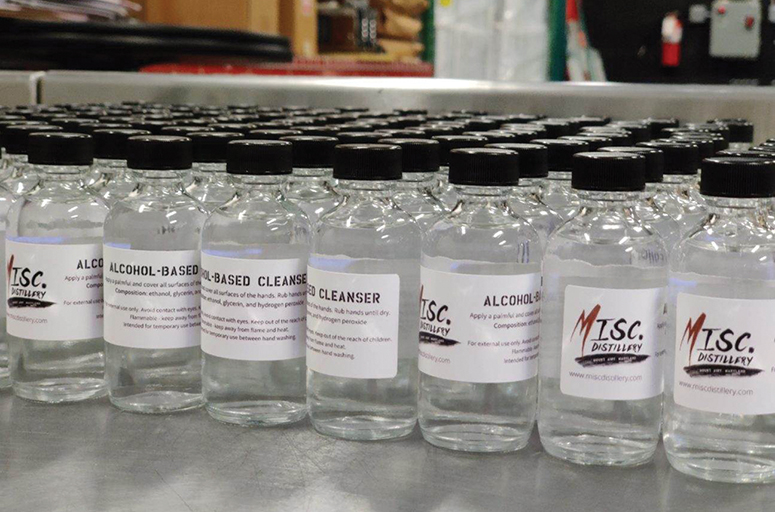
Brad Blackwell, owner and founder of Lost Ark Distilling in Columbia, has been making similar decisions. "The requests are so big right now," he marveled. "I'm also Vice President of the Maryland State Distillers Guild. The last message I got from them just a few days ago [this interview was conducted in early April] was they've collected a backlog of requests that totals about 15,000 gallons of hand sanitizer! We have gotten requests from local businesses like a small home pest company to calls from Amazon and BG&E."
Of course, these are good problems to have in such a time of crisis and further proof of how vital the state's beverage business is. No one is complaining Meg (MacWhirter) McNeill of MISCellaneous Distillery in Mt. Airy commented, "As soon as we closed our tasting room, we made the decision to pivot our focus to hand sanitizer. It took a few days to source the additional inputs needed and begin to create the first batch for donation to non-profit partners. Our primary donations have gone to Meals on Wheels of Central Maryland . . . though we have been able to help with other requests from local non-profits, as well."
Blackwell said it wasn't a huge changeover in terms of equipment. The biggest change has been the packaging and Lost Ark's supply chain. "That's been a huge challenge, transitioning and figuring out where to buy the specific bottles and caps and have the labels designed in order to be printed," he said.
Lents concurred, adding, "Everybody has a different set-up in the way their distillery works. For us, we don't have an automated bottling line. Even the bottler that we have isn't really equipped to handle the style of bottles we're putting hand sanitizer in. So, we're bottling by hand. We essentially have a spigot on the bottom of a big tank. Once we blend up a new batch of sanitizer, we stick one bottle at a time under there, fill it, cap it, then label it."
Other area distilleries that have followed suit include: Twin Valley Distillers in Rockville, which is using a recipe of ethanol, glycerol, lemongrass oil, Vitamin E oil, and aloe vera gel; McClintock Distilling in Frederick, which is combining the alcohol they normally make with glycerin, and hydrogen peroxide; and Cotton & Reed distillery in Washington, D.C., which has been giving away hand sanitizer with every purchase of rum in addition to giving away sanitizer to local service industry workers.
Lents concluded, "We can all come together and fill the need. We're part of a direct response to a need created by this crisis. We're happy to be part of the Resistance!"
Click Here to check out the article as it appeared in The Journal.
